Essay on Contractual Relationships: UK Law Formation and Remedies
VerifiedAdded on 2023/01/06
|6
|1837
|65
Essay
AI Summary
This essay provides a comprehensive overview of contract law within the United Kingdom's legal framework, specifically focusing on the formation of contractual relationships. It defines a contract as a legally enforceable agreement between parties, detailing the essential elements required for a valid contract, including mutual interest, valid agreement, capacity of parties (above 18 and of sound mind), agreed terms and conditions, and proper signing. The essay outlines the structure of the British court system and the role of the Ombudsman. It further explores the concept of a breach of contract and the available remedies, such as monetary damages, specific performance, rescission, and liquidation damages. The essay also provides legal advice on suitable courts for resolving contractual disputes. This essay offers valuable insights into the intricacies of contract law, providing a solid foundation for understanding agreements and their legal implications.
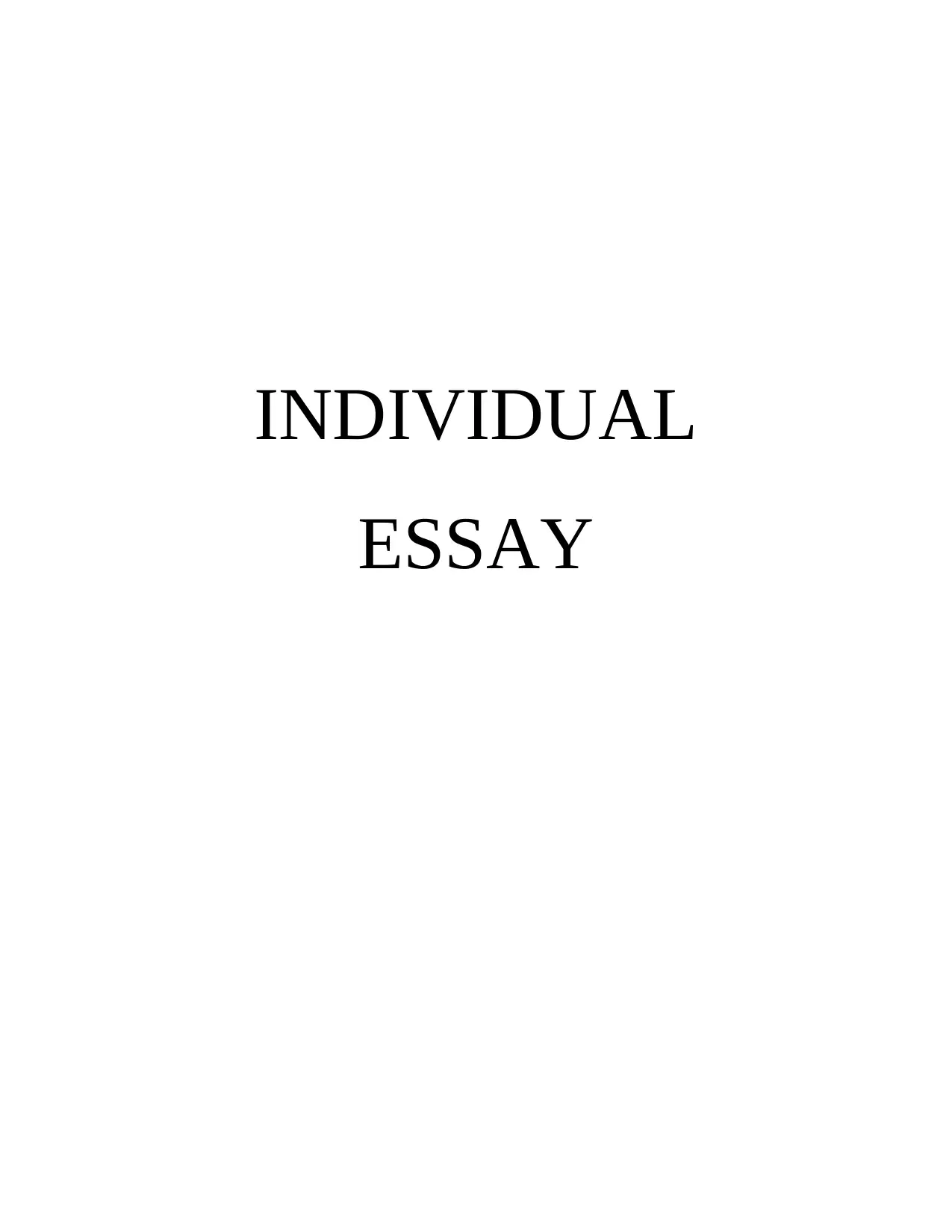
INDIVIDUAL
ESSAY
ESSAY
Paraphrase This Document
Need a fresh take? Get an instant paraphrase of this document with our AI Paraphraser
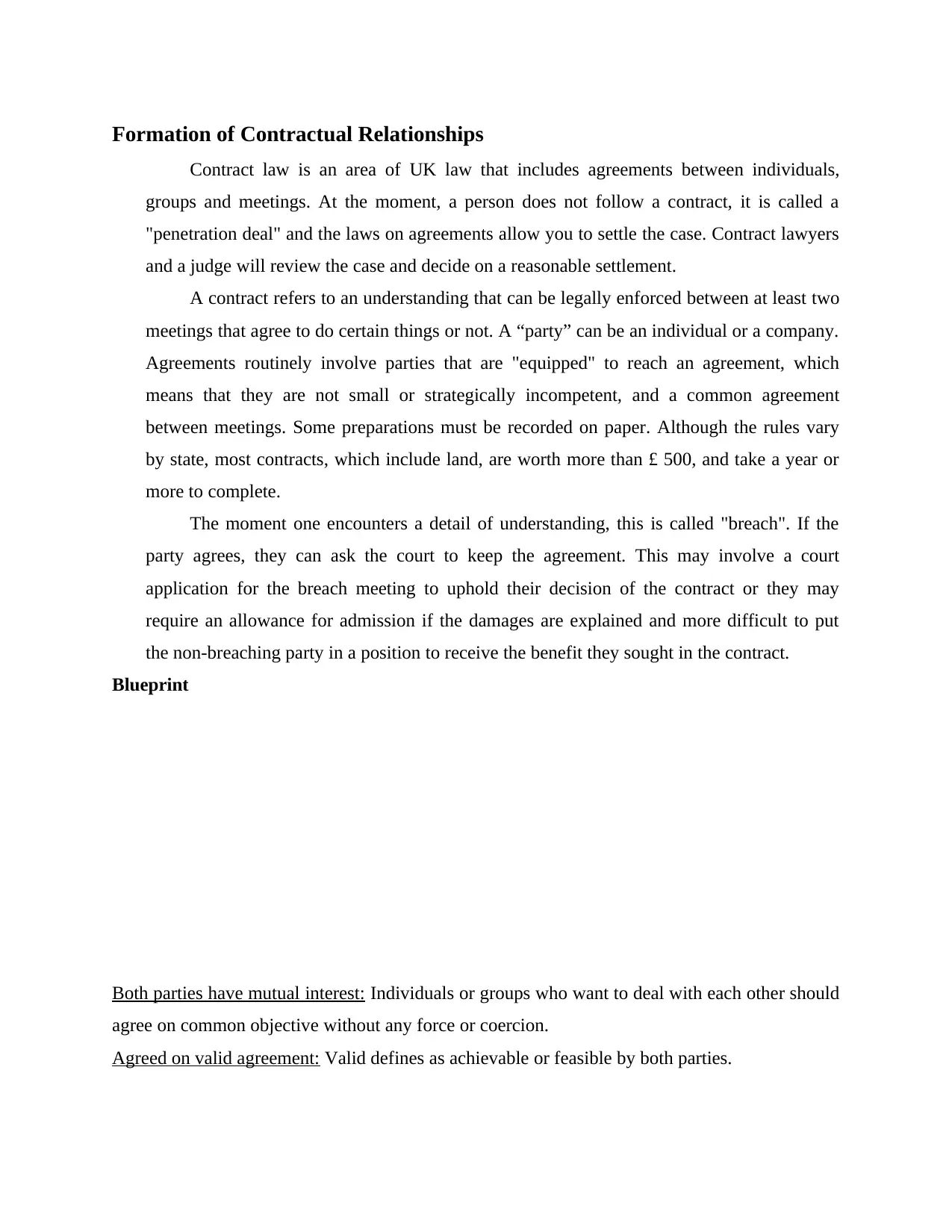
Formation of Contractual Relationships
Contract law is an area of UK law that includes agreements between individuals,
groups and meetings. At the moment, a person does not follow a contract, it is called a
"penetration deal" and the laws on agreements allow you to settle the case. Contract lawyers
and a judge will review the case and decide on a reasonable settlement.
A contract refers to an understanding that can be legally enforced between at least two
meetings that agree to do certain things or not. A “party” can be an individual or a company.
Agreements routinely involve parties that are "equipped" to reach an agreement, which
means that they are not small or strategically incompetent, and a common agreement
between meetings. Some preparations must be recorded on paper. Although the rules vary
by state, most contracts, which include land, are worth more than £ 500, and take a year or
more to complete.
The moment one encounters a detail of understanding, this is called "breach". If the
party agrees, they can ask the court to keep the agreement. This may involve a court
application for the breach meeting to uphold their decision of the contract or they may
require an allowance for admission if the damages are explained and more difficult to put
the non-breaching party in a position to receive the benefit they sought in the contract.
Blueprint
Both parties have mutual interest: Individuals or groups who want to deal with each other should
agree on common objective without any force or coercion.
Agreed on valid agreement: Valid defines as achievable or feasible by both parties.
Contract law is an area of UK law that includes agreements between individuals,
groups and meetings. At the moment, a person does not follow a contract, it is called a
"penetration deal" and the laws on agreements allow you to settle the case. Contract lawyers
and a judge will review the case and decide on a reasonable settlement.
A contract refers to an understanding that can be legally enforced between at least two
meetings that agree to do certain things or not. A “party” can be an individual or a company.
Agreements routinely involve parties that are "equipped" to reach an agreement, which
means that they are not small or strategically incompetent, and a common agreement
between meetings. Some preparations must be recorded on paper. Although the rules vary
by state, most contracts, which include land, are worth more than £ 500, and take a year or
more to complete.
The moment one encounters a detail of understanding, this is called "breach". If the
party agrees, they can ask the court to keep the agreement. This may involve a court
application for the breach meeting to uphold their decision of the contract or they may
require an allowance for admission if the damages are explained and more difficult to put
the non-breaching party in a position to receive the benefit they sought in the contract.
Blueprint
Both parties have mutual interest: Individuals or groups who want to deal with each other should
agree on common objective without any force or coercion.
Agreed on valid agreement: Valid defines as achievable or feasible by both parties.
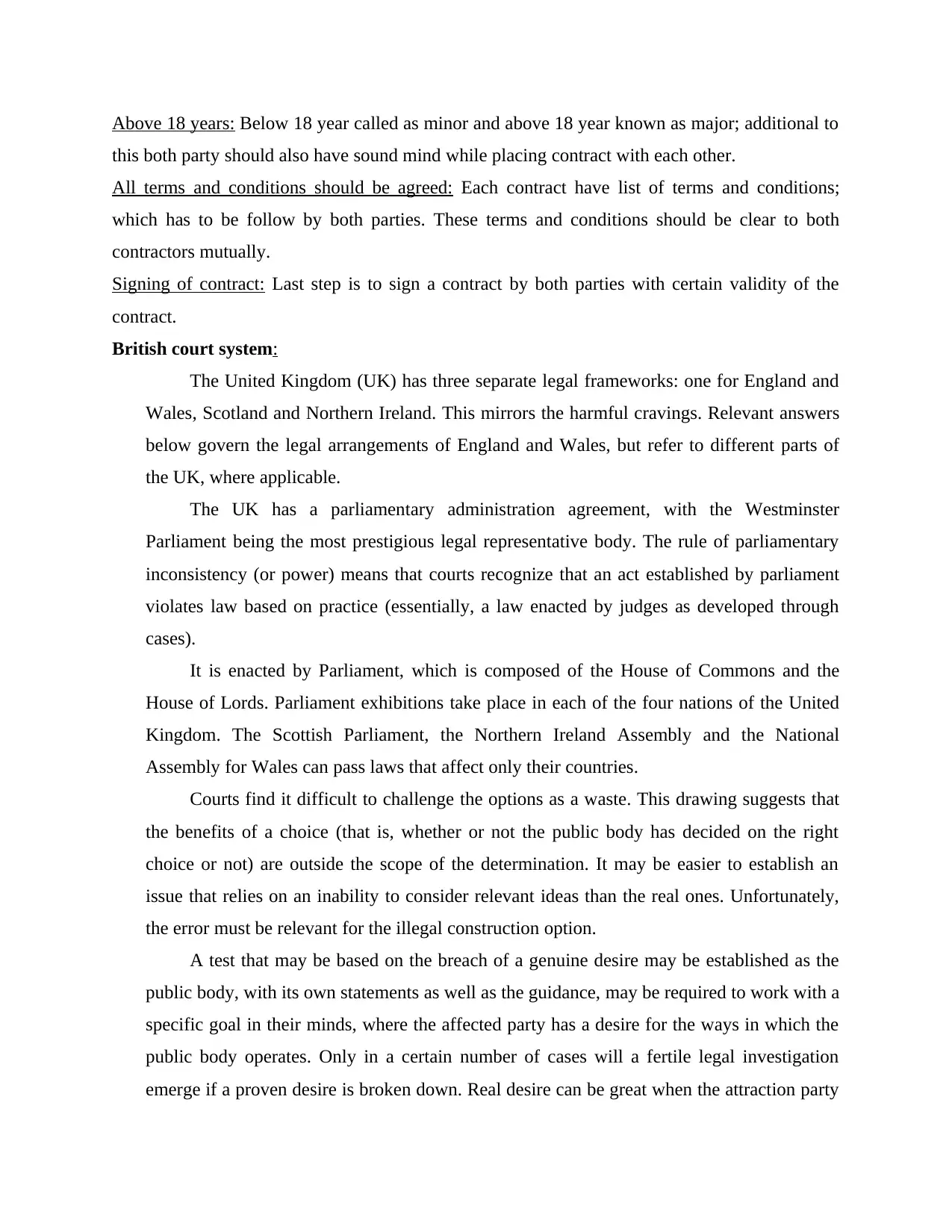
Above 18 years: Below 18 year called as minor and above 18 year known as major; additional to
this both party should also have sound mind while placing contract with each other.
All terms and conditions should be agreed: Each contract have list of terms and conditions;
which has to be follow by both parties. These terms and conditions should be clear to both
contractors mutually.
Signing of contract: Last step is to sign a contract by both parties with certain validity of the
contract.
British court system:
The United Kingdom (UK) has three separate legal frameworks: one for England and
Wales, Scotland and Northern Ireland. This mirrors the harmful cravings. Relevant answers
below govern the legal arrangements of England and Wales, but refer to different parts of
the UK, where applicable.
The UK has a parliamentary administration agreement, with the Westminster
Parliament being the most prestigious legal representative body. The rule of parliamentary
inconsistency (or power) means that courts recognize that an act established by parliament
violates law based on practice (essentially, a law enacted by judges as developed through
cases).
It is enacted by Parliament, which is composed of the House of Commons and the
House of Lords. Parliament exhibitions take place in each of the four nations of the United
Kingdom. The Scottish Parliament, the Northern Ireland Assembly and the National
Assembly for Wales can pass laws that affect only their countries.
Courts find it difficult to challenge the options as a waste. This drawing suggests that
the benefits of a choice (that is, whether or not the public body has decided on the right
choice or not) are outside the scope of the determination. It may be easier to establish an
issue that relies on an inability to consider relevant ideas than the real ones. Unfortunately,
the error must be relevant for the illegal construction option.
A test that may be based on the breach of a genuine desire may be established as the
public body, with its own statements as well as the guidance, may be required to work with a
specific goal in their minds, where the affected party has a desire for the ways in which the
public body operates. Only in a certain number of cases will a fertile legal investigation
emerge if a proven desire is broken down. Real desire can be great when the attraction party
this both party should also have sound mind while placing contract with each other.
All terms and conditions should be agreed: Each contract have list of terms and conditions;
which has to be follow by both parties. These terms and conditions should be clear to both
contractors mutually.
Signing of contract: Last step is to sign a contract by both parties with certain validity of the
contract.
British court system:
The United Kingdom (UK) has three separate legal frameworks: one for England and
Wales, Scotland and Northern Ireland. This mirrors the harmful cravings. Relevant answers
below govern the legal arrangements of England and Wales, but refer to different parts of
the UK, where applicable.
The UK has a parliamentary administration agreement, with the Westminster
Parliament being the most prestigious legal representative body. The rule of parliamentary
inconsistency (or power) means that courts recognize that an act established by parliament
violates law based on practice (essentially, a law enacted by judges as developed through
cases).
It is enacted by Parliament, which is composed of the House of Commons and the
House of Lords. Parliament exhibitions take place in each of the four nations of the United
Kingdom. The Scottish Parliament, the Northern Ireland Assembly and the National
Assembly for Wales can pass laws that affect only their countries.
Courts find it difficult to challenge the options as a waste. This drawing suggests that
the benefits of a choice (that is, whether or not the public body has decided on the right
choice or not) are outside the scope of the determination. It may be easier to establish an
issue that relies on an inability to consider relevant ideas than the real ones. Unfortunately,
the error must be relevant for the illegal construction option.
A test that may be based on the breach of a genuine desire may be established as the
public body, with its own statements as well as the guidance, may be required to work with a
specific goal in their minds, where the affected party has a desire for the ways in which the
public body operates. Only in a certain number of cases will a fertile legal investigation
emerge if a proven desire is broken down. Real desire can be great when the attraction party
⊘ This is a preview!⊘
Do you want full access?
Subscribe today to unlock all pages.

Trusted by 1+ million students worldwide
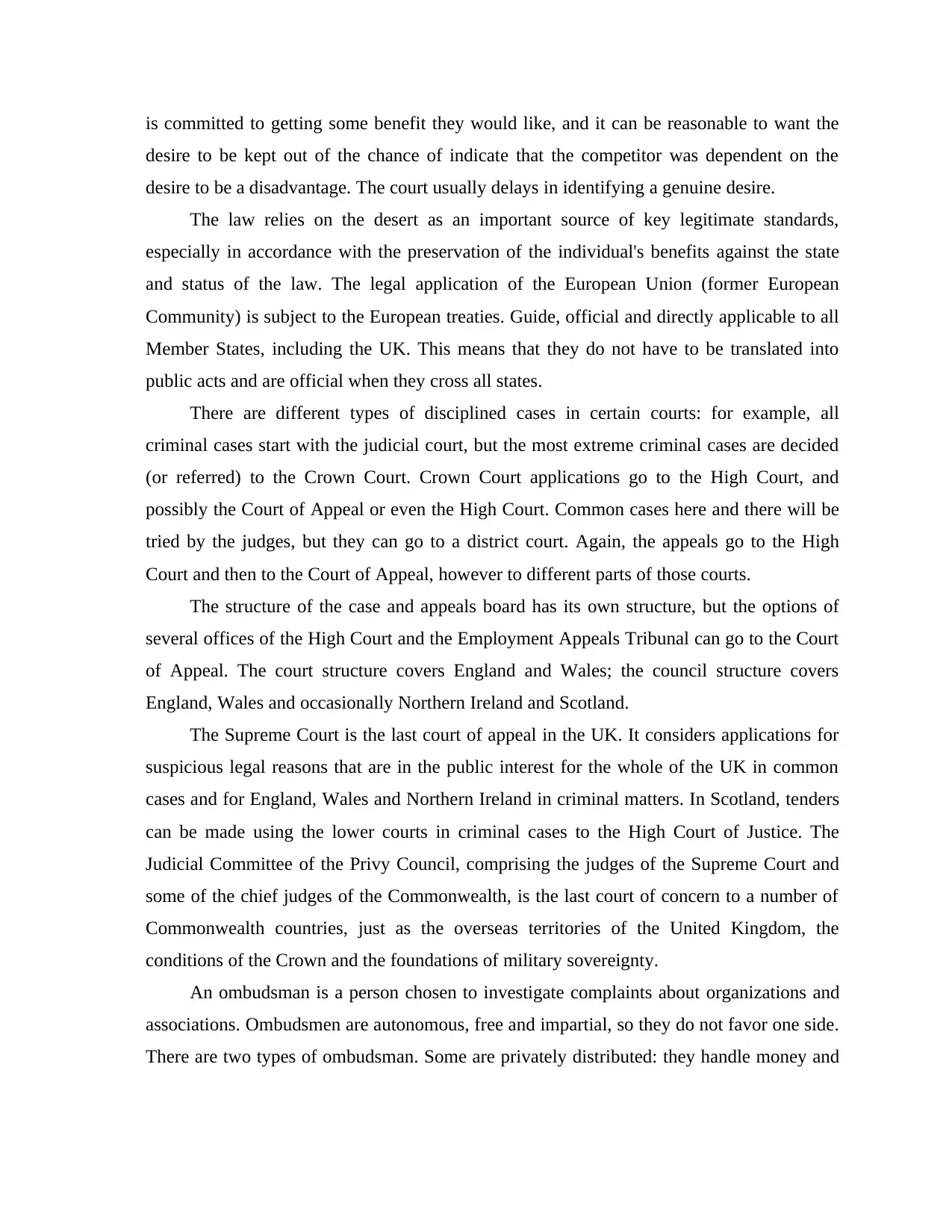
is committed to getting some benefit they would like, and it can be reasonable to want the
desire to be kept out of the chance of indicate that the competitor was dependent on the
desire to be a disadvantage. The court usually delays in identifying a genuine desire.
The law relies on the desert as an important source of key legitimate standards,
especially in accordance with the preservation of the individual's benefits against the state
and status of the law. The legal application of the European Union (former European
Community) is subject to the European treaties. Guide, official and directly applicable to all
Member States, including the UK. This means that they do not have to be translated into
public acts and are official when they cross all states.
There are different types of disciplined cases in certain courts: for example, all
criminal cases start with the judicial court, but the most extreme criminal cases are decided
(or referred) to the Crown Court. Crown Court applications go to the High Court, and
possibly the Court of Appeal or even the High Court. Common cases here and there will be
tried by the judges, but they can go to a district court. Again, the appeals go to the High
Court and then to the Court of Appeal, however to different parts of those courts.
The structure of the case and appeals board has its own structure, but the options of
several offices of the High Court and the Employment Appeals Tribunal can go to the Court
of Appeal. The court structure covers England and Wales; the council structure covers
England, Wales and occasionally Northern Ireland and Scotland.
The Supreme Court is the last court of appeal in the UK. It considers applications for
suspicious legal reasons that are in the public interest for the whole of the UK in common
cases and for England, Wales and Northern Ireland in criminal matters. In Scotland, tenders
can be made using the lower courts in criminal cases to the High Court of Justice. The
Judicial Committee of the Privy Council, comprising the judges of the Supreme Court and
some of the chief judges of the Commonwealth, is the last court of concern to a number of
Commonwealth countries, just as the overseas territories of the United Kingdom, the
conditions of the Crown and the foundations of military sovereignty.
An ombudsman is a person chosen to investigate complaints about organizations and
associations. Ombudsmen are autonomous, free and impartial, so they do not favor one side.
There are two types of ombudsman. Some are privately distributed: they handle money and
desire to be kept out of the chance of indicate that the competitor was dependent on the
desire to be a disadvantage. The court usually delays in identifying a genuine desire.
The law relies on the desert as an important source of key legitimate standards,
especially in accordance with the preservation of the individual's benefits against the state
and status of the law. The legal application of the European Union (former European
Community) is subject to the European treaties. Guide, official and directly applicable to all
Member States, including the UK. This means that they do not have to be translated into
public acts and are official when they cross all states.
There are different types of disciplined cases in certain courts: for example, all
criminal cases start with the judicial court, but the most extreme criminal cases are decided
(or referred) to the Crown Court. Crown Court applications go to the High Court, and
possibly the Court of Appeal or even the High Court. Common cases here and there will be
tried by the judges, but they can go to a district court. Again, the appeals go to the High
Court and then to the Court of Appeal, however to different parts of those courts.
The structure of the case and appeals board has its own structure, but the options of
several offices of the High Court and the Employment Appeals Tribunal can go to the Court
of Appeal. The court structure covers England and Wales; the council structure covers
England, Wales and occasionally Northern Ireland and Scotland.
The Supreme Court is the last court of appeal in the UK. It considers applications for
suspicious legal reasons that are in the public interest for the whole of the UK in common
cases and for England, Wales and Northern Ireland in criminal matters. In Scotland, tenders
can be made using the lower courts in criminal cases to the High Court of Justice. The
Judicial Committee of the Privy Council, comprising the judges of the Supreme Court and
some of the chief judges of the Commonwealth, is the last court of concern to a number of
Commonwealth countries, just as the overseas territories of the United Kingdom, the
conditions of the Crown and the foundations of military sovereignty.
An ombudsman is a person chosen to investigate complaints about organizations and
associations. Ombudsmen are autonomous, free and impartial, so they do not favor one side.
There are two types of ombudsman. Some are privately distributed: they handle money and
Paraphrase This Document
Need a fresh take? Get an instant paraphrase of this document with our AI Paraphraser
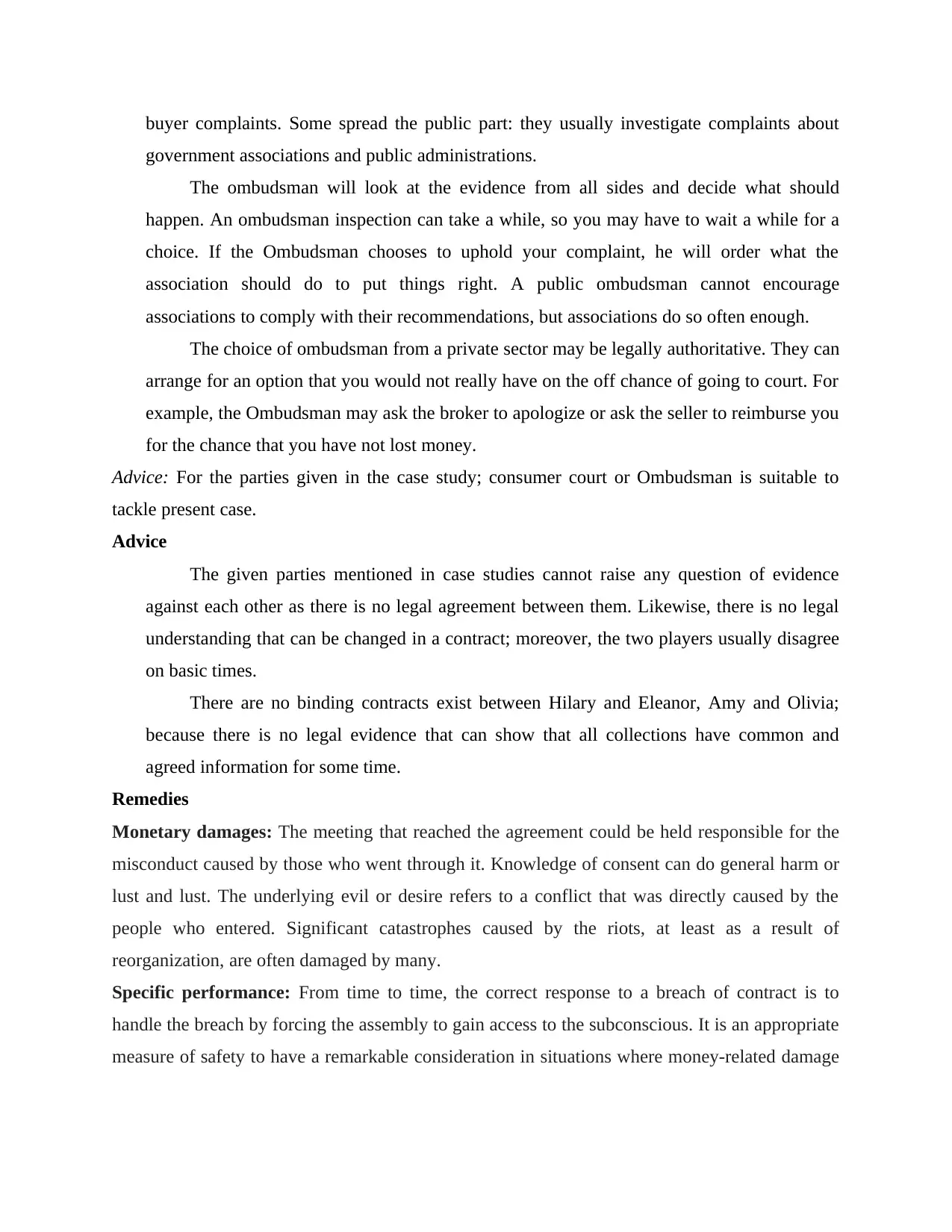
buyer complaints. Some spread the public part: they usually investigate complaints about
government associations and public administrations.
The ombudsman will look at the evidence from all sides and decide what should
happen. An ombudsman inspection can take a while, so you may have to wait a while for a
choice. If the Ombudsman chooses to uphold your complaint, he will order what the
association should do to put things right. A public ombudsman cannot encourage
associations to comply with their recommendations, but associations do so often enough.
The choice of ombudsman from a private sector may be legally authoritative. They can
arrange for an option that you would not really have on the off chance of going to court. For
example, the Ombudsman may ask the broker to apologize or ask the seller to reimburse you
for the chance that you have not lost money.
Advice: For the parties given in the case study; consumer court or Ombudsman is suitable to
tackle present case.
Advice
The given parties mentioned in case studies cannot raise any question of evidence
against each other as there is no legal agreement between them. Likewise, there is no legal
understanding that can be changed in a contract; moreover, the two players usually disagree
on basic times.
There are no binding contracts exist between Hilary and Eleanor, Amy and Olivia;
because there is no legal evidence that can show that all collections have common and
agreed information for some time.
Remedies
Monetary damages: The meeting that reached the agreement could be held responsible for the
misconduct caused by those who went through it. Knowledge of consent can do general harm or
lust and lust. The underlying evil or desire refers to a conflict that was directly caused by the
people who entered. Significant catastrophes caused by the riots, at least as a result of
reorganization, are often damaged by many.
Specific performance: From time to time, the correct response to a breach of contract is to
handle the breach by forcing the assembly to gain access to the subconscious. It is an appropriate
measure of safety to have a remarkable consideration in situations where money-related damage
government associations and public administrations.
The ombudsman will look at the evidence from all sides and decide what should
happen. An ombudsman inspection can take a while, so you may have to wait a while for a
choice. If the Ombudsman chooses to uphold your complaint, he will order what the
association should do to put things right. A public ombudsman cannot encourage
associations to comply with their recommendations, but associations do so often enough.
The choice of ombudsman from a private sector may be legally authoritative. They can
arrange for an option that you would not really have on the off chance of going to court. For
example, the Ombudsman may ask the broker to apologize or ask the seller to reimburse you
for the chance that you have not lost money.
Advice: For the parties given in the case study; consumer court or Ombudsman is suitable to
tackle present case.
Advice
The given parties mentioned in case studies cannot raise any question of evidence
against each other as there is no legal agreement between them. Likewise, there is no legal
understanding that can be changed in a contract; moreover, the two players usually disagree
on basic times.
There are no binding contracts exist between Hilary and Eleanor, Amy and Olivia;
because there is no legal evidence that can show that all collections have common and
agreed information for some time.
Remedies
Monetary damages: The meeting that reached the agreement could be held responsible for the
misconduct caused by those who went through it. Knowledge of consent can do general harm or
lust and lust. The underlying evil or desire refers to a conflict that was directly caused by the
people who entered. Significant catastrophes caused by the riots, at least as a result of
reorganization, are often damaged by many.
Specific performance: From time to time, the correct response to a breach of contract is to
handle the breach by forcing the assembly to gain access to the subconscious. It is an appropriate
measure of safety to have a remarkable consideration in situations where money-related damage
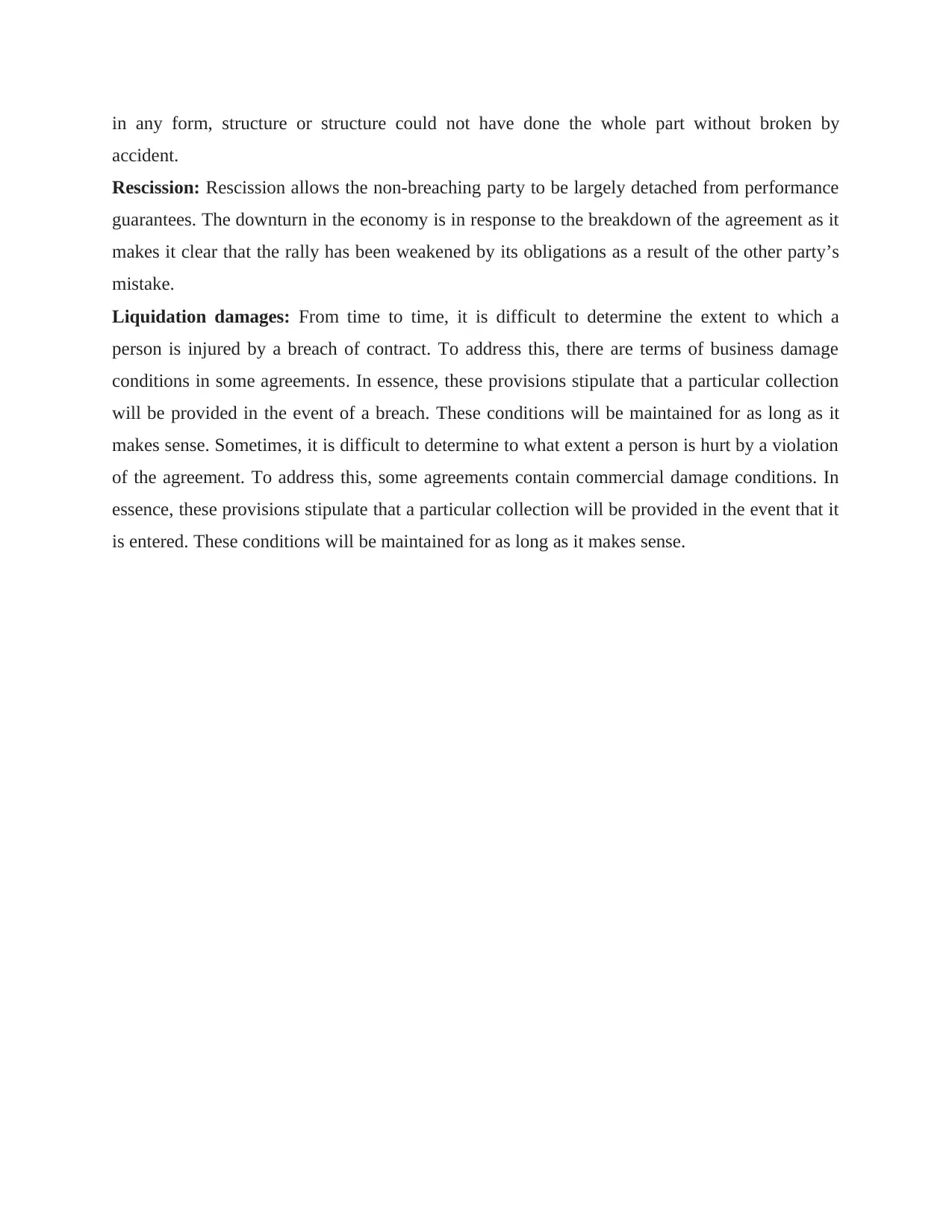
in any form, structure or structure could not have done the whole part without broken by
accident.
Rescission: Rescission allows the non-breaching party to be largely detached from performance
guarantees. The downturn in the economy is in response to the breakdown of the agreement as it
makes it clear that the rally has been weakened by its obligations as a result of the other party’s
mistake.
Liquidation damages: From time to time, it is difficult to determine the extent to which a
person is injured by a breach of contract. To address this, there are terms of business damage
conditions in some agreements. In essence, these provisions stipulate that a particular collection
will be provided in the event of a breach. These conditions will be maintained for as long as it
makes sense. Sometimes, it is difficult to determine to what extent a person is hurt by a violation
of the agreement. To address this, some agreements contain commercial damage conditions. In
essence, these provisions stipulate that a particular collection will be provided in the event that it
is entered. These conditions will be maintained for as long as it makes sense.
accident.
Rescission: Rescission allows the non-breaching party to be largely detached from performance
guarantees. The downturn in the economy is in response to the breakdown of the agreement as it
makes it clear that the rally has been weakened by its obligations as a result of the other party’s
mistake.
Liquidation damages: From time to time, it is difficult to determine the extent to which a
person is injured by a breach of contract. To address this, there are terms of business damage
conditions in some agreements. In essence, these provisions stipulate that a particular collection
will be provided in the event of a breach. These conditions will be maintained for as long as it
makes sense. Sometimes, it is difficult to determine to what extent a person is hurt by a violation
of the agreement. To address this, some agreements contain commercial damage conditions. In
essence, these provisions stipulate that a particular collection will be provided in the event that it
is entered. These conditions will be maintained for as long as it makes sense.
⊘ This is a preview!⊘
Do you want full access?
Subscribe today to unlock all pages.

Trusted by 1+ million students worldwide
1 out of 6
Related Documents
Your All-in-One AI-Powered Toolkit for Academic Success.
+13062052269
info@desklib.com
Available 24*7 on WhatsApp / Email
![[object Object]](/_next/static/media/star-bottom.7253800d.svg)
Unlock your academic potential
Copyright © 2020–2026 A2Z Services. All Rights Reserved. Developed and managed by ZUCOL.





